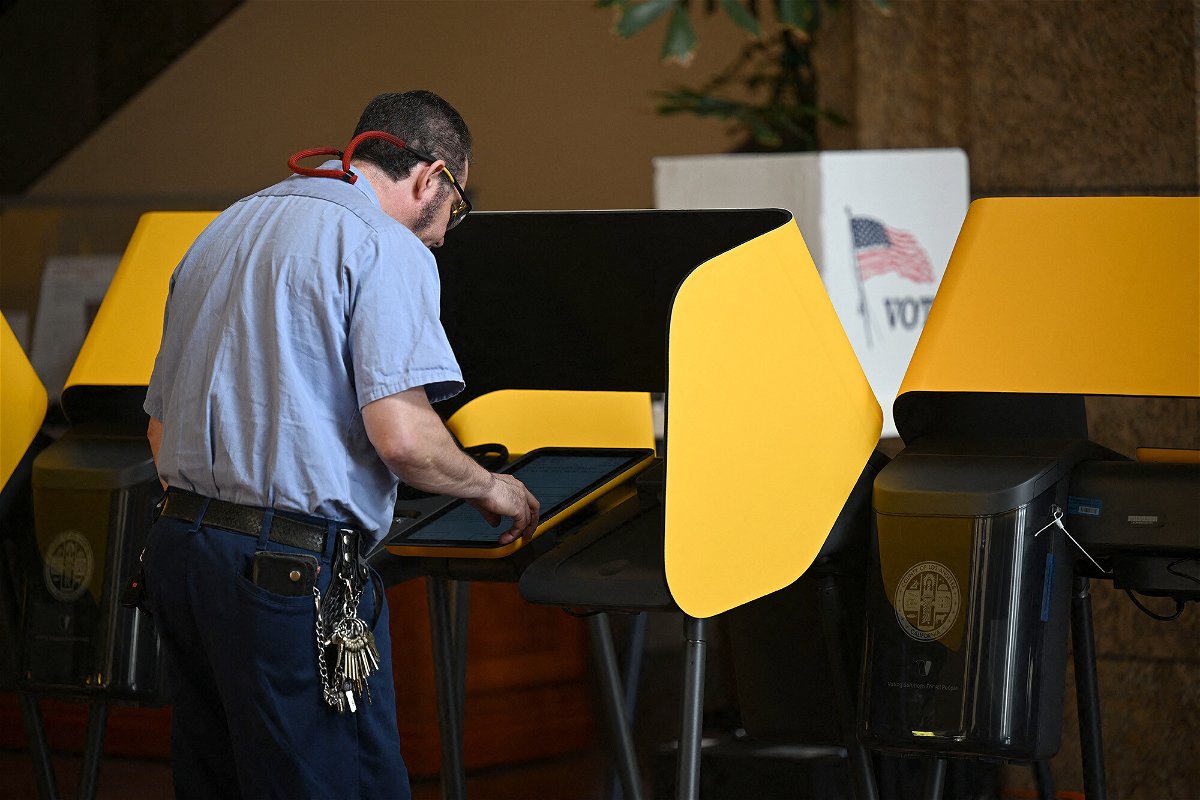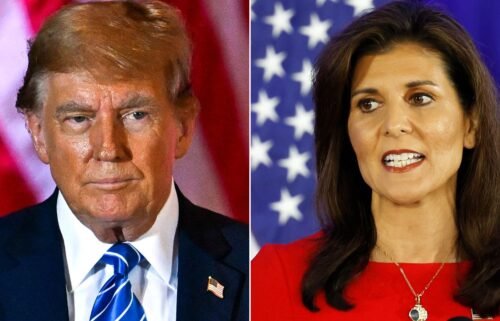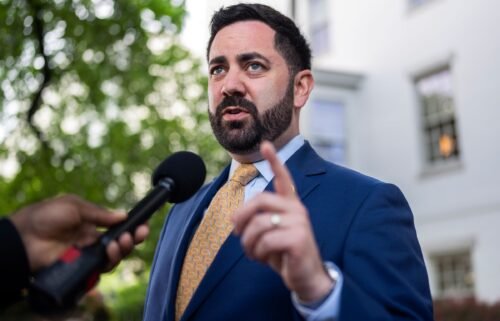Voters will have their say on expanding Medicaid, raising the minimum wage and taxing the rich in some states

While Democrats in Congress have had many of their progressive plans thwarted this term
By Tami Luhby, CNN
While Democrats in Congress have had many of their progressive plans thwarted this term, left-leaning advocates in multiple states are hoping to advance their causes at the ballot box.
Among the numerous initiatives on the ballot Tuesday are a host of measures related to health care and finances. Voters will decide whether to expand Medicaid in South Dakota, increase the minimum wage in Nebraska and Nevada, raise taxes on the wealthy in California and Massachusetts and address medical debt in Arizona.
Americans are having trouble making ends meet as inequality increases, said Kelly Hall, executive director of The Fairness Project, which is backing a number of the measures. The ballot initiatives are aimed at easing the burden for working people.
“That help is not coming from federal lawmakers. It is not coming from their state politicians,” she said. “And so whether it’s on minimum wage or expanding health care or limiting debt collection practices, people are starting to take those very basic kitchen-table issues into their own hands.”
Here’s a sampling of those ballot measures:
Expanding Medicaid in South Dakota
South Dakota voters will decide whether to broaden Medicaid to roughly 42,500 low-income residents starting in 2023.
It’s the seventh such effort to expand Medicaid in Republican-led states, which began with the approval of Maine voters in 2017. Ballot initiatives were also successful in Missouri, Oklahoma, Idaho, Nebraska and Utah. All were backed by The Fairness Project.
More than 60 organizations — including the South Dakota Farmers Union, the Greater Sioux Falls Chamber of Commerce and multiple health care and religious groups — have endorsed Amendment D. It would open up coverage to adults making less than roughly $19,000 a year.
Currently, childless adults are not eligible for Medicaid in South Dakota, and parents must have very low incomes to qualify — about $1,000 a month for a family of four.
By expanding Medicaid, South Dakota will receive an additional $328 million in federal funds the first year and generate 4,000 new jobs, according to Zach Marcus, campaign manager for South Dakotans Decide Healthcare, which is advocating for the ballot measure. The state’s Legislative Research Council found last year that expansion would save South Dakota $162.5 million over five years.
Many Republican officials oppose the measure, citing its potential future costs. States are responsible for picking up 10% of the health care tab of the expansion enrollees.
South Dakota Gov. Kristi Noem, a Republican, does not support the initiative, though she has said she will carry it out if voters approve it. An expansion bill failed in a state Senate vote earlier this year.
A recent South Dakota State University poll showed that 53% of likely registered voters support the measure, about 20% are opposed and 27% are undecided.
South Dakota is currently one of 12 states that have opted not to expand Medicaid. The only remaining states where citizen-led ballot initiatives could be possible are Florida and Wyoming, Hall said.
Raising the minimum wage in Nebraska and Nevada
Nebraska voters will decide whether to raise the state’s minimum wage to $15 an hour by 2026, up from the current $9 an hour.
It would benefit about 150,000 workers, according to the National Employment Law Project and the Economic Policy Institute, which are both left-leaning groups. Some 75% of the workers are over the age of 20.
The measure would provide these workers with an additional $2,100 in pay, said Kate Wolfe, campaign manager of Raise the Wage Nebraska. More than 25 organizations and lawmakers are in the coalition supporting Initiative 433, which is backed by The Fairness Project.
Voters in 2014 approved a ballot measure to raise the minimum wage to $9 an hour by 2016. The current campaign collected more than twice the number of signatures needed to place it on the ballot, Wolfe said.
Opponents, however, say that the initiative would hurt businesses in the state and reduce employment opportunities for youth.
“The proposed increase in the initiative is a 66.7% increase over four years,” Bud Synhorst, CEO of the Lincoln Independent Business Association, wrote in a local business publication last month. “That is a radical increase that will be felt across the economy.”
In Nevada, voters will have their say on a state constitutional amendment to increase the minimum wage to $12 an hour by 2024. The measure would also remove an existing provision setting different rates for the minimum wage based on whether the employer offers certain health benefits.
Currently, the state minimum wage is set to rise to $12 an hour for workers who don’t receive certain health benefits and $11 an hour for those who do in 2024.
Supporters of the initiative, Question 2 on the ballot, say that workers should have a constitutional guarantee of a $12 hourly minimum wage, preventing lawmakers from reducing it in the future. Opponents say the change isn’t necessary because the state legislature already has the authority to increase the minimum wage.
Increasing taxes on the rich in California and Massachusetts
California’s Proposition 30 would add a surtax of 1.75% on people making more than $2 million a year. This is on top of the state’s highest income tax rate of 12.3%. It would raise an estimated $3.5 billion to $5 billion. Most of the funds would go to promote zero-emission vehicles and wildfire prevention and control.
The measure, however, is very controversial, said Howard Gleckman, senior fellow at the nonpartisan Tax Policy Center.
It’s backed largely by Lyft, which, like other ride-share companies, is subject to another state rule requiring that it use mostly zero-emission vehicles by 2030. Opponents, including the state Republican party, say the ballot measure is an attempt by Lyft to get taxpayers to foot the bill for the company.
One other notable opponent: Democratic Gov. Gavin Newsom, who is appearing in an ad aimed at defeating the initiative.
“Prop 30 is being advertised as a climate initiative, but in reality it was devised by a single corporation to funnel state income taxes to benefit their company,” he says in the ad.
Supporters, which include environmental groups, public interest organizations, unions and a bevy of Democratic officials, say the measure is needed to address climate change in the state. It would generate roughly $100 billion over the next 20-plus years, they said.
The Massachusetts ballot measure, meanwhile, would impose a 4% surtax on those who earn more than $1 million, Gleckman said. That’s on top of the state’s existing 5% income tax rate.
It would raise about $1.3 billion in 2023 and affect about 0.6% of state residents, according to a Tufts University estimate. The money from Question 1 would go to fund education, roads, bridges and public transit.
Opponents, which include many business groups, argue that the initiative would be one of the biggest income tax hikes in the state’s history and would not impose much accountability on politicians on how they would spend the funds.
Both the California and Massachusetts measures have a good chance of passing in the blue states, Gleckman said.
“These are tax increases on a very small number of rich people, and they’re being used for very popular purposes,” he said. “So it makes it easier.”
Adding medical debt measures in Arizona
Voters in Arizona will decide whether to change some rules governing medical debt owed by residents.
Proposition 209 would cap the interest rate on medical debt at 3% and limit wage garnishment for medical debt to a maximum of 30% of earnings. It would also increase the value of primary residences and cars that would be protected from medical debt collectors to $400,000 and $15,000, respectively, up from $250,000 and $6,000, said Rodd McLeod, spokesperson for Healthcare Rising Arizona, which is supporting the measure that is also backed by The Fairness Project.
The bill does not forgive any medical debt, McLeod said.
Opponents argue the initiative would actually hurt consumers. It would make it harder for Arizonians to obtain credit and for businesses in the state to collect on debt, as well as increase interest rates on consumer debt, according to Protect Our Arizona, which is looking to defeat the measure.
The-CNN-Wire
™ & © 2022 Cable News Network, Inc., a Warner Bros. Discovery Company. All rights reserved.


